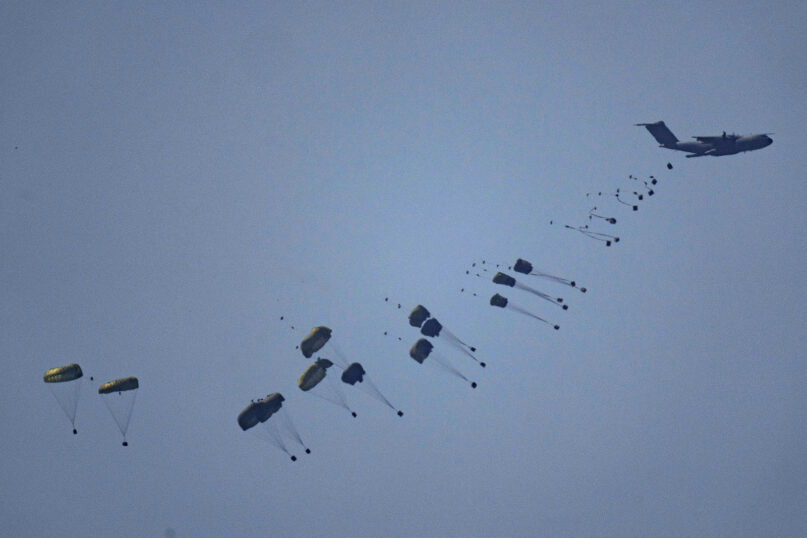(RNS) — For a man who is worried about looking vigorous, President Joe Biden’s decision this week to order the U.S. military to drop 37,000 meals-ready-to eat to a starving population of millions in Gaza appeared weak and impotent. The parachutes of some of the foodstuff air-dropped by American planes malfunctioned, killing Palestinians. In last night’s State of the Union address, Biden announced he would send the U.S. military to build a temporary pier to inject more food aid into Gaza, but even that gesture seemed to misunderstand the situation.
This famine is not the result of natural causes but a deliberate act of revenge by an American ally. But faced with daily footage of Palestinians starving under Israel’s blockade of food for 2.3 million Palestinians trapped in Gaza, Biden put pressure not on Israel but on Hamas, through negotiators from Egypt and Qatar, hoping to score a deal for a cease-fire and a hostage release before the holy month of Ramadan begins March 11 or 12.
American and Israeli military experts have made it clear that they fear that without a cease-fire, Jerusalem and the rest of the West Bank, as well as Arab and Islamic countries, could well explode in protest. During the holy month, in which Muslims fast from sunrise to sunset, tens of thousands of worshippers come to the Al-Aqsa Mosque, Islam’s third-holiest site and the namesake of the “Al-Aqsa Storm,” as Hamas dubbed its attack against Israel on Oct. 7.
The name of the operation had plenty of backstory. The Oct. 7 attack came after years of provocations over the use of the mosque complex. The Muslim response has been angry and typically caused Israelis to answer with even more powerful violence to put down the protests, causing a vicious and often deadly cycle.
In past years, Israel has restricted access to Muslim worshippers who come to pray all night in the last days of Ramadan as part of the traditional ritual of I’tikaf. This year, the Waqf Jerusalem Council, a committee of Jordanian Islamic notables that manages the site, has compromised and allowed Muslims to stay on successive weekends (Thursday and Friday nights) as well as on the 27th day of Ramadan, the intense period of prayer called the Night of Power.
Long the recognized custodians of Islamic and Christian holy places in Jerusalem, the Jordanian royal government is keen to ensure that the highly emotional month for pious Muslims is not troubled by demonstrations or violence.
Countering this desire are the many forces that can go grievously wrong over the next month. Bending to international pressure, Israel’s wartime coalition government removed Al-Aqsa from the portfolio of Itamar Ben Gvir, the national security minister who has made provocative visits to the mosque complex’s plaza.
If no agreement is reached, all eyes will be focused on Jerusalem as the holy month begins next week. The potential for the Gaza conflict spreading to Jerusalem and other West Bank cities is high, which will turn up the pressure on other Arab and Muslim countries, who will witness their own angry anti-Israel and anti-West protests.
On the other hand, a negotiated cease-fire that coincides with the holy month, which ends April 9, would very likely be observed not only by Hamas but also extremists in Lebanon, Yemen and Iraq as long as the Israelis do not provoke the Palestinian Muslim faithful.
For now, the prospects for peace will diminish with every passing day of Ramadan that goes without a cease-fire, which continues to be the most powerful antidote to the potential of an explosion in the region.
In many parts of the world, sane heads are hoping that they can prevail to ensure that the holy month is dedicated not to anger and violence but to spiritual supplications for continued peace.





